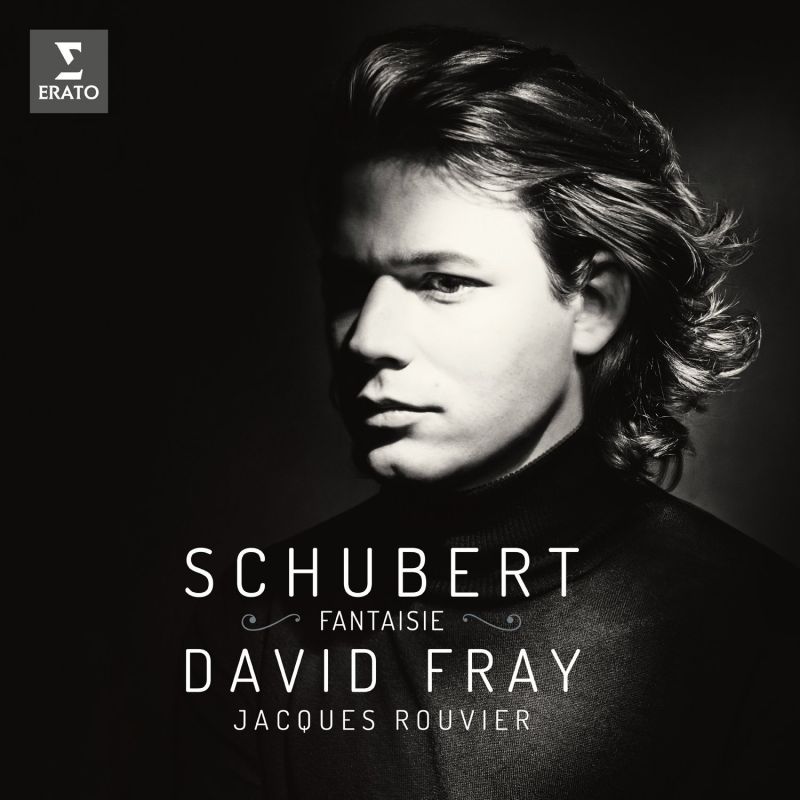SCHUBERT Fantasie Sonata. Hungarian Melody
View record and artist detailsRecord and Artist Details
Composer or Director: Franz Schubert
Genre:
Instrumental
Label: Erato
Magazine Review Date: 05/2015
Media Format: CD or Download
Media Runtime: 78
Mastering:
DDD
Catalogue Number: 2564 61669-9

Tracks:
| Composition | Artist Credit |
|---|---|
| Sonata for Piano No. 18 |
Franz Schubert, Composer
David Fray, Piano Franz Schubert, Composer |
| Ungarische Melodie |
Franz Schubert, Composer
David Fray, Piano Franz Schubert, Composer |
| Fantasie |
Franz Schubert, Composer
David Fray, Piano Franz Schubert, Composer Jacques Rouvier, Piano |
| Allegro, 'Lebensstürme' |
Franz Schubert, Composer
David Fray, Piano Franz Schubert, Composer |
Author: Stephen Plaistow
David Fray has called the disc ‘The Fantasy according to Schubert’. An exaggeration, a bit of a selling point perhaps? I think not. Forget improvisations and freewheeling forms: the title is relevant to the space Schubert so often needs to attain, as Mahler put it, ‘freedom below the surface of convention’. When the G major solo Sonata, D894, was new and appeared as a Sonata-Fantasy – the publisher’s title, not the composer’s – an alert contemporary noted that ‘within its not unusual formal layout, everything internal is uncustomary and full of fantasy’.
David Fray is alive to the way the music moves at every point and skilled at evoking worlds of sound beyond the piano. Sometimes the orchestra is close, or the voice, or the dance floor, or an impression of something floating in from outdoors, from the countryside maybe. His rhythm is immaculate, with a naturalness in matters of articulation and continuity that appears instinctive. He keeps the music airborne. Yet perhaps most admirable are his insights in the first movement. Here the character and ‘fantasy’ of this sonata is apparent in its extraordinary inspiration at the start, which has to do with the very nature of piano sound – more precisely by the piano’s capacity to prolong a simple pianissimo chord through resonance and reverberation to an echo of it, after the flick of a grace note, at the point when the original chord is dying away. No one had written for the piano in this way before.
Jacques Rouvier was David Fray’s teacher. They make superb duettists, and I think one would have to go back to Murray Perahia and Radu Lupu – long ago – to find a far-reaching version of the F minor Fantasia, D940, as fine as theirs. Again, sound is the key, frequently determined here by associations with the orchestra and with singing, and they control it ideally in the realms of dynamics, colour and nuance. There is often a lot of it but they temper the sonorities with impeccable balancing and make you aware of how important degrees of loud and soft are in Schubert, both as volumes of sound and as indicators of character. They are bold as well as dreamlike in a piece which constantly interrupts itself and diverts the argument from its expected course. You hold your breath in the Italianate lyricism of the slow section, with its reputed reference to Paganini (‘I thought I heard an angel sing’).
How very different is the ambition of the Allegro in A minor, D947, nearly as long with its exposition repeat as the entire Fantasia. Another publisher’s title – Lebensstürme (‘The Storms of Life’) – has stuck to it and perhaps not inappropriately. The storms of life Schubert knew a lot about, his music tells us, and their capriciousness and destabilising force seem to blow through this immense symphonic span. If you’ve never heard it in a performance as good as this it will establish Schubert for you as a four-hand master and banish, I hope, all thoughts of piano duets as a genre of uncertain standing.
Discover the world's largest classical music catalogue with Presto Music.

Gramophone Digital Club
- Digital Edition
- Digital Archive
- Reviews Database
- Full website access
From £8.75 / month
Subscribe
Gramophone Full Club
- Print Edition
- Digital Edition
- Digital Archive
- Reviews Database
- Full website access
From £11.00 / month
Subscribe
If you are a library, university or other organisation that would be interested in an institutional subscription to Gramophone please click here for further information.




